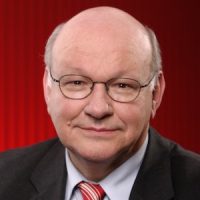Episode 34: Berlin Wall: The View from the West

Jeff Rathke
President of AGI
Jeffrey Rathke is the President of the American Institute for Contemporary German Studies at the Johns Hopkins University in Washington, DC.
Prior to joining AICGS, Jeff was a senior fellow and deputy director of the Europe Program at CSIS, where his work focused on transatlantic relations and U.S. security and defense policy. Jeff joined CSIS in 2015 from the State Department, after a 24-year career as a Foreign Service Officer, dedicated primarily to U.S. relations with Europe. He was director of the State Department Press Office from 2014 to 2015, briefing the State Department press corps and managing the Department's engagement with U.S. print and electronic media. Jeff led the political section of the U.S. Embassy in Kuala Lumpur from 2011 to 2014. Prior to that, he was deputy chief of staff to the NATO Secretary General in Brussels. He also served in Berlin as minister-counselor for political affairs (2006–2009), his second tour of duty in Germany. His Washington assignments have included deputy director of the Office of European Security and Political Affairs and duty officer in the White House Situation Room and State Department Operations Center.
Mr. Rathke was a Weinberg Fellow at Princeton University (2003–2004), winning the Master’s in Public Policy Prize. He also served at U.S. Embassies in Dublin, Moscow, and Riga, which he helped open after the collapse of the Soviet Union. Mr. Rathke has been awarded national honors by Estonia, Latvia, and Lithuania, as well as several State Department awards. He holds an M.P.P. degree from Princeton University and B.A. and B.S. degrees from Cornell University. He speaks German, Russian, and Latvian.
__

Walter Momper
Former Governing Mayor of Berlin
Walter Momper was elected as Governing Mayor of Berlin in 1989, a post which he held during the fall of the Berlin Wall and German re- unification until 1991. In this capacity he served as President of the German upper house, the Bundesrat, from 1989 to 1990.
His political career began in 1967 when he joined the SPD. From Chairperson of the Kreuzberg Young Socialists (1969-1971) he rose to Deputy (1974) and subsequently Chairperson of the local party organisation in 1980 - a post which he held until 1985. He has been a member of the Berlin House of Representatives since 1975, was Chairperson of the Berlin parliamentary party from 1985 to 1989 and a member of the SPD national party committee from 1988 to 1993.
Walter Momper has worked in the private sector since 1992 when he joined the Dr. Ellinghaus real estate development company as Chief Executive. In 1993 he founded his own real estate company, Momper Projektentwicklungs GmbH, of which he is owner and General Manager.
From 1999 to 2001 he was vice-speaker of the Abgeordnetenhaus of Berlin (Parliament of the city of Berlin), since 2001 to 2011 he was Speaker of the Abgeordnetenhaus of Berlin.
Images of the fall of the Berlin Wall dominate the public consciousness when thinking about the end of the Cold War. Photos of jubilant Germans standing atop the symbol of their oppression convey the notion of triumph: of West over East, of capitalism over communism, of right over wrong. But what actually happened in Berlin to make the fall of the Wall possible? Was its opening and the ensuing flow of people from East to West intended? And how did Western officials react to the sudden announcement that the Wall would be open “sofort”—immediately?
On this episode of The Zeitgeist, Jeff Rathke talks with Walter Momper, Governing Mayor of Berlin in 1989, about the events on and leading up to that historic November 9. What did Western officials expect to happen? How did they cope with the very immediate challenges of traffic, maps, and money? Their conversation shows the broader picture of the fall of the Berlin Wall thirty-one years ago.
Episode 02: The Wall: Legacy of Divided Berlin
Host
Jeff Rathke, President, AGI
Guest
Walter Momper, Former Governing Mayor of Berlin






